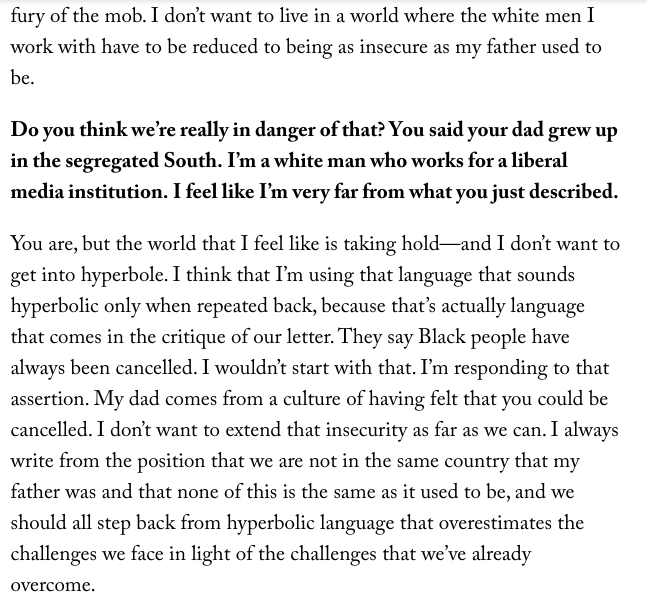"Being a white man in media in 2020 is like being a Black man in the Jim Crow south. Also, we should all step back from hyperbolic language."
And yeah, if you ever see me take a call from Chotiner, know that it's because I know in my heart that I deserve what's coming. https://www.newyorker.com/news/q-and-a/thomas-chatterton-williams-on-race-identity-and-cancel-culture
This next quote, though, strikes me as the core of Thomas Chatterton Williams et al's argument, and the source of that argument's fundamental fatal weakness:
"if there’s a punitive aspect to the collective response to something you do and it’s around a not-yet-solidified norm, that seems to me to be very different than to transgressing what seems to be a commonly understood norm."
To start with, the difference between a "commonly understood norm" and a "not-yet-solidified norm" seems clearly to be necessarily a contextual, subjective, what's-your-peer-group based one. How could it not be?
And if it is—and, again, it absolutely is—then how is what TCW is arguing for distinguishable from "If my social circle have reached consensus that embracing a particular point-of-view should be a firing offense, then it should be. If not, not"?
Beyond that, it's not at all clear what the principled argument for "it's okay to fire someone for transgressing a norm, so long as that norm is widely embraced" even IS. That's not a civil-libertarian argument, and it's not a free-speech argument, so what is it?
And of course saying it's okay to fire someone for bigotry, but only if it's "commonly understood" that what the person said is bad is itself just another way of saying that the more marginalized your target is, the LESS you should have to fear retribution for attacking them.
Which kind of feels like it might be exactly the opposite of how things should work.
And yes, I know I keep climbing up on this hobby horse, but it offends me. These people are marching under my flag, but they're flying it upside down, and they don't know any of the words to the anthem.
There are two or three places in the TCW interview where he really steps in it, but mostly the whole thing is just ... boring. He just hasn't thought through these issues in a careful way, and as a result he doesn't have much insight into them.
TCW: "if there’s a punitive aspect to the collective response to something you do and it’s around a not-yet-solidified norm, that seems to me to be very different than to transgressing what seems to be a commonly understood norm."
Me:
Me:
The more I mull the TCW interview, the more I lean toward thinking his core principle is that people shouldn't be punished for saying stuff if they didn't know they were going to get in trouble for saying it. https://twitter.com/eaton/status/1286103571986100226
Which is wrong in two important ways, right? First, it doesn't merely centers the intent of the speaker over the impact of their words, it posits obliviousness as a positive good.
"You shouldn't be punished for causing harm if you didn't know you were causing harm" is the kind of thing that people say when their moral universe is populated by people who do harm rather than by people who suffer harm at the hands of others.
And second, as @eaton notes, it elevates a person's obligations to their employer over both their obligation to others AND their obligation to their own conscience.
Which again, sure, I guess, but it doesn't have anything to do with freedom of speech or freedom of conscience or open dialogue or any of the stuff he claims to be interested in.

 Read on Twitter
Read on Twitter


